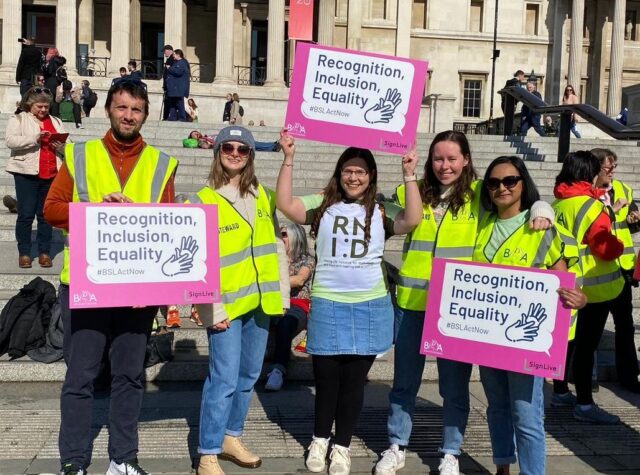Watch this page in BSL
In this blog RNID’s Policy and Campaigns Lead, Rob Geaney, looks at the items included in the King’s Speech which are relevant to RNID’s influencing work and sets out what it could mean for our people who are deaf or have a hearing loss.
The King’s Speech is an important day in our political calendar. It is where, through the monarch, the Government sets out its planned programme of laws and policy priorities for the upcoming yearly session of Parliament. This first King’s Speech for our new Government carries particular interest.
Disclosing the pay gap between disabled and non-disabled people
In this week’s King’s Speech, the Government set out 39 Bills that it will present to Parliament this year. These include a Draft Equality (Race and Disability) Bill, which will attempt to reduce the unfair pay gaps that exist across society, including for disabled people.
RNID welcomes this legislation. Our recent research on public attitudes has shown that 32% of BSL users and 18% of deaf people have experienced negative attitudes from work managers over the last 12 months. We think this helps explain why some deaf people cannot progress in work and suffer a pay penalty.
The new legislation will require some businesses and companies to publish information on their pay gap between disabled and non-disabled people. This needs to be done carefully, as many people don’t disclose their disability to their employer and won’t be recorded within these statistics. But, if done properly, this measure could create transparency around disability pay and motivate employers to understand the needs of their deaf and disabled staff.
Improving the NHS
The Government also used the King’s Speech to commit to improving the NHS. They reaffirmed the principle of a health service that provides care based on need rather than profit. Given the ongoing inability of many patients to access free NHS wax removal services, it is positive that the new Government wants to improve free access to healthcare.
The Government also seeks to reduce waiting times and focus on prevention. We made these very points in our pre-election policy calls, which are set out in our charity manifesto, Loud and Clear.
We’ve already suggested how this can be done in NHS audiology services – using new technology and investing in services and introducing systematic hearing checks across the NHS. We will be making these points to Ministers over the coming months.
What happens next
RNID will be working with Ministers and MPs over the coming months. We seek to share our evidence and policy, which demonstrates how government policy can improve the lives of people who are deaf or have a hearing loss.
To receive updates and find out how you can get involved, join our Campaigns Network.
